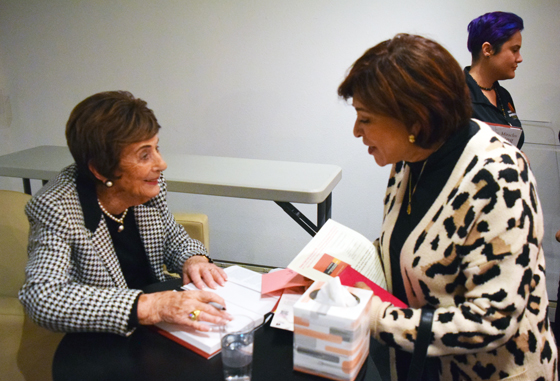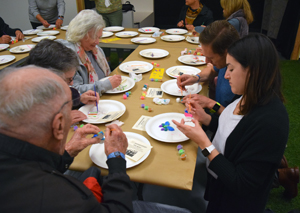

Other items in this column include:
* Recommended reading


SAN DIEGO – Only a few moments after her audience had sat in stunned silence hearing about how the mother of Fanny Krasner Lebovits sacrificed her life so her youngest child should not have to go alone to her death, a cell phone tinkled from somewhere in the front of the audience.
No one answered the phone, and you could feel the audience becoming indignant. How could anyone break the mood like this? one was tempted to wonder. And then the 97-year-old Lebovits, up on the stage of the New Americans Museum, recognized that the intrusive noise was coming from her own cell phone! She had forgotten to turn it off before being escorted to the stage. Could somebody please turn it off for her?
Immediately, the mood in the room changed. Lebovits and the audience joined in laughter – laughter which Lebovits, a former nurse, said truly is the best form of medication.
The incident that Lebovits earlier had retold also was well-covered in her memoir, Memories, Miracles & Meaning: Insights of a Holocaust Survivor. Along with her mother and her two sisters, Fanny – then known as Feiga-Chase “Fanny” Judelowitz – had been sent from their home in the seaport city of Libau, Latvia, to the Kaiserwald Concentration Camp, near the capital city of Riga.
There was a “selection,” and as was the Nazis’ practice, people who were too young, old, or infirm to work were placed in a line marked for death, while those for whom the Nazis still had use as slave laborers were placed in another line. Initially Fanny, her sister Jenny, and their mother were put in the slave laborers’ line, while the youngest sister, Leibele, only 8, was placed in the death queue.
Fanny’s mother could not bear to see her youngest child go alone to whatever horrible future awaited her. Though Fanny and Jenny cried and protested that she must save herself, pulling at her arms to prevent her from switching lines, the mother was resolute. She ran to join Leibele in the other line. “I can’t let my little Liebele go by herself. You two can look after yourselves. Fanny, look after Jenny.” And that was the last they saw of her. “My mother always put others first,” commented Fanny in her memoir. “There isn’t a day that I don’t think about my mother’s selfless act.”
It clearly isn’t easy for Lebovits to retell this heart-breaking story. You could hear the strain in her voice and see it in her eyes. But, as she told the audience, it is important that people know what happened during the Holocaust so that they can understand where hate can lead. Whenever possible, she said, hate must be replaced with love.
As a Holocaust survivor, Fanny Krasner Lebovits belonged to a vital sub-set of “New American” immigrants who made San Diego their home, and who, through their patriotism, industry, and service, helped to develop our “nation of immigrants.”

As a member of Hadassah, Lebovits rose to the very top rank of the regional organization which supports local projects as well as the famed Hadassah Hospital in Jerusalem, where doctors work on patients of all backgrounds, Muslim, Jewish, Christian, and Druze. among them. That they are fellow human beings in need of care is all that matters.
The Butterfly Project and the New Americans Museum partnered on Lebovits’ talk. This organization is in the process of painting and exhibiting around the world 1.5 million ceramic butterflies, each in memory of one of the 1.5 million children—mostly Jewish, but of other faiths as well—who, like little Leibele, died at the hands of the Nazis.
After a short question and answer session, dozens of people queued up to have Lebovits autograph her memoir, while across the hall, other attendees kneeled at small tables to paint butterflies intended to remind the world never to forget. The butterflies painted on this occasion will be on temporary display at the New Americans Museum, located in Liberty Station.
*
Recommended reading
The Moderate Voice website has a story outlining some of the features of President Trump’s Mideast plan, which is expected to be unveiled on Tuesday in his meeting with Israel’s Prime Minister Binyamin Netanyahu and Blue and White party challenger Gen. Benny Gantz.
Israel Hayom reports that during recent flooding in Nahariya, Arab and Jewish residents rescued each other.
CTech, a website promoting clean technology, reports experiments in Israel, Poland, and South Africa to turn plastic waste into new products, including even baby oil.
The Toronto Sun has a review of the Holocaust-related The Serpent and the Red Thread by Diane Weber Bederman.
*
Donald H. Harrison is editor of San Diego Jewish World. He may be contacted via donald.harrison@sdjewishworld.com
Great article as always!